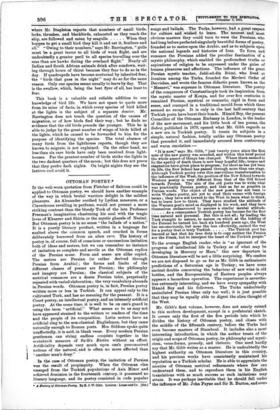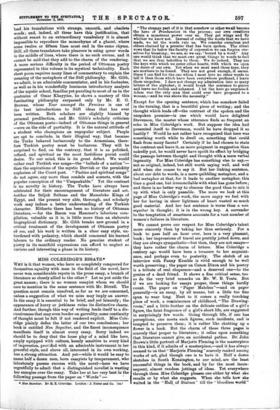OTTOMAN POETRY.* IF the well-worn quotation from Fletcher of Saltoun
could be applied to Ottoman poetry, we should have another example of the way in which brutal warriors delight in the mildest pleasures. An Alexander soothed by Lydian measures, or a Claverhouse revelling in perfume, would not present a more striking contrast than the bloody Turk of the late Professor Freeman's imagination chastening his soul with the tragic loves of Khusrev and Shirin or the mystic ghazels of Nesimi. But Ottoman poetry is in no sense "the ballads of a nation." It is a purely literary product, written in a language far exalted above the common speech, and couched in forms deliberately borrowed from an alien race. The history of poetry is, of course, full of conscious or unconscious imitation both of ideas and metres, but we can remember no instance of imitation so complete and servile as the Ottoman replica of the Persian muse. Form and sense are alike copied. The metres are Persian (or rather derived through Persian from Arabic) ; the forms and limits of the different classes of poems are Persian; the philosophy and imagery are Persian; the classical subjects of the metrical romances are a dozen Persian tales, perpetually repeated with varied elaboration; the very vocabulary abounds in Persian words. Ottoman poetry is, in fact, Persian poetry written more or less in Turkish. It can appeal only to the cultivated Turk, and has no meaning for the peasant. It is a Court poetry, an intellectual poetry, and an intensely artificial poetry. At the same time, it is well to be on one's guard in using the term "artificial." What seems so to us may not have appeared strained to the writers or readers of the time and the people of its composition. Latin metres have an artificial ring to the non-classical Englishman, but they came naturally enough to Roman poets. Mrs. Siddons spoke quite unaffectedly, it is said, in blank verse. Every modern Persian gentleman can string endless couplets together in the mutakdrib measure of Sali's Bitable, without an effort. Artificiality depends very much upon one's preconceived notions of the natural, and is often no more affected than " another man's dory."
In the case of Ottoman poetry, the imitation of Persian was the result of propinquity. When the Ottoman clan emerged from the Turkish populations of Asia Minor and achieved dominion in the fourteenth century, it possessed no literary language, and its poetry consisted in rude popular
• A History of Ottoman Poetry, By E. J. W. Gibb. London: Lune and Co. Ma]
songs and balls. The Turks, however, had a great respect for culture and wished to learn. The nearest and most obvious masters they could turn to were the Persians, who had long before perfected singularly beautiful forms of poetry, founded as to metre upon the Arabic, and as to subjects upon the national legends and histories of Iran. To form and romance the Persians added the peculiar fascination of a mystic philosophy, which enabled the profoundest truths or aspirations of religion to be expressed under the guise of human pleasures and affections. The influence of the great Persian mystic teacher, Jelal-ed-din Rfuni, who lived at Iconium among the Turks, founded the Mevlevi Order of Dervishes, and wrote the famous didactic poem known as the " Meanevi," was supreme in Ottoman literature. The poetry of the conquerors of Constantinople took its inspiration from the mystic master of Konya, and for over five centuries it remained Persian, mystical or romantic, rigid in form and sense, and cramped in a traditional mould from which there seemed no escape. It is only in the last half-century that Turkish poets have burst their bonds. Hamid Bey, the present Councillor of the Ottoman Embassy in London, is the leader of the new movement, and his little book of ten poems, the Sahrci, published in 1879, opened what Mr. Gibb regards as a new era in Turkish poetiy. It treats its subjects in a simple, natural fashion, totally unlike any Ottoman poetry that preceded it, and immediately aroused keen controversy and warm emulation :—
"It is now," says Mr. Gibb, "just twenty years since the first note of the new poetry was sounded, and within this brief period the whole aspect of things has changed. Where there seemed to lie the apathy of death there is now busy hopeful life ; torpor and stagnation have given place to progress; for short as has yet been its life, the New School has passed through more than one stage. Although Turkish poetry owes this marvellous transformation to the influence of the West, the position of the New School towards Western poetry is very different from that of the Old School towards Persian. The aim of the old poets was to write what was practically Persian poetry, and that as far as possible ja Persian words. The object of the new poets has not been to write Western poetry, nor yet to stud their verses with foreign terms ; they have not turned to the West to learn what to think. but to learn how to think. They have studied the attitude of the Western poet's mind as displayed in his work, and they have themselves endeavoured to assume a similar mental attitude.
As a consequence Turkish poetry has become for the first time natural and personal. But this is not all; by leading the Turk straight to nature, to nature on which at the bidding of the Persian he turned his back six hundred years ago, the West has unconsciously, but none the less effectively, opened the way for a poetry that is truly Turkish The Turkish poet has learned at last that his true duty is to copy neither the Persian nor the Frank, but to interpret the heart of the Turkish people."
To the average English reader, who is "as ignorant of the progress of intellectual life in Turkey as of what may be
developing in Mercury or Mars," this new departure in Ottoman literature will be not a little surprising. We confess we are not disposed to go as far as Mr. Gibb in enthusiastic predictions of a Saturnian age in Turkey ; we have some ancient doubts concerning the behaviour of new wine in old bottles, and the Europeanising of Eastern peoples always appears a hazardous operation. The experiment is neverthe- less extremely interesting, and we have every sympathy with Haraid Bey and his followers. The Turks undoubtedly assimilated Persian ideas only too well; it is just possible that they may be equally able to digest the alien thought of the West.
Mr. Gibb's first volume, however, does not nearly extend to this modern development, except in a prefatorial sketch. It 'covers only the first of the five periods into which he divides the history of Ottoman poetry, and closes with the middle of the fifteenth century, before the Turks had even become masters of Stamboul. It includes also a most interesting introduction, in which the author treats of the origin and scope of Ottoman poetry, its philosophy and mysti- cism, verse-forms, prosody, and rhetoric. One need hardly say that Mr. Gibb writes as a master. He is undoubtedly the highest authority on Ottoman literature in this country, and his previous works have consistently maintained his reputation as a Turkish scholar. He is able to appreciate the niceties of Ottoman metrical refinements where few can understand them, and to reproduce them in his English translations with as much success as such imitations may attain. It was perhaps inevitable that he should fall under the influence of Mr. John Payne and Sir R. Burton, and over.
load his translations with strange, uncouth, and obsolete words; and, indeed, all three have this justification, that without resort to an extraordinary vocabulary it is almost impossible to reproduce the monorhyme of a ghazel, where some twelve or fifteen lines must end in the same rhyme. Still, all three translators take pleasure in using queer words in the midclle of lines, where there is no such excuse, and it cannot be said that they add to the charm of the rendering. A more serious difficulty in the period of Ottoman poetry represented in this volume is its mystical technicality. Each short poem requires many lines of commentary to explain the meaning of the metaphors of the Safi philosophy. Mr. Gibb, we admit, is an admirable commentator, and in his footnotes, as well as in his wonderfully luminous introductory analysis of the mystic school, familiar yet puzzling to most of us in the quatrains of Omar Khayyam, he shows a mastery of this fascinating philosophy surpassed only by Mr. E. G. Browne, whose Year amongst the Persians is one of the best introductions to Sufi ideas that has ever been written. Both scholars are slightly biassed by personal predilection, and Mr. Gibb's scholarly criticism of the Ottoman poets—indeed of Ottoman things in general —errs on the side of partiality. It is the natural attitude of a student who champions an unpopular subject. People are apt to conclude, in their illogical way, that because the Turks behaved barbarously to the Armenians, there- fore Turkish poetry must be barbarous. They will be surprised to find, on the contrary, that it is as polished, refined, and spiritual as the most fastidious purist could desire. To our mind, this is its great defect. We would rather read Turkish war songs—the "ballads of a nation "- than the aspirations of the mystic Dervish or the pernickity euphuism of the Court poet. "Psalms and spiritual songs" do not agree, any more than rondeh3 and sonnets, with the popular conception of the "Unspeakable." Yet the contrast is no novelty in history. The Turks have always been celebrated for their encouragement of literature and art, testibus the Seljuk Sultans and the Mameluke Kings of Egypt, and the present very able, thorough, and scholarly work may induce a better understanding of the Turkish character. Hitherto there has been no history of Ottoman literature, — for the Baron von Hammer's laborious com- pilation, valuable as it is, is little more than an elaborate biographical dictionary. Mr. Gibb breaks new ground in a critical treatment of the development of Ottoman poetry ab ore, and his work is written in a clear easy style, un- burdened with pedantry, which should commend his learned labours to the ordinary reader. No genuine student of poetry in its manifold expressions can afford to neglect so curious and interesting a phase in its history.























































 Previous page
Previous page